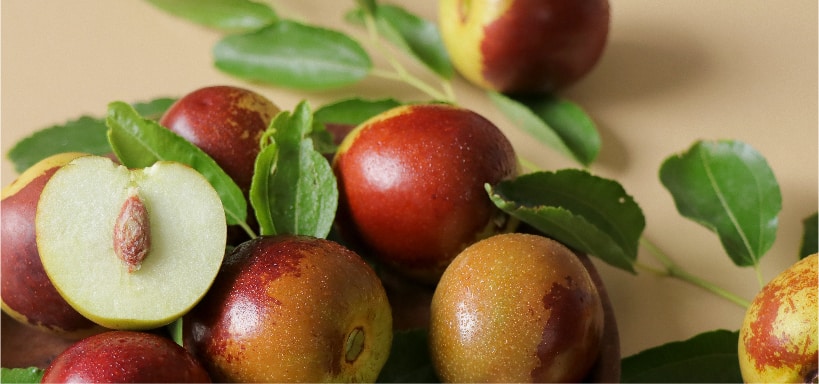
I bet you’ve heard of the candies known as jujubes, juju fruits or Jujyfruits. Despite having “fruits” in their names, these variations of chewy, colorful, artificially flavored candies are anything but healthy. So why do these unnatural products have the same name as the natural exotic fruit — jujube fruit — that’s loaded with health benefits?
According to food historian Charles Perry, some candies originally contained jujube fruit juice. At the turn of the century, it was common for people to use these candies for chest complaints. They were especially popular in theaters when moviegoers didn’t want their coughs to disturb fellow viewers.
Today, candies called “jujubes” unfortunately don’t contain any actual jujube juice — however, the good news is that jujube fruits are alive and well. Also called red dates, jujube can be eaten fresh, raw or infused into tea.
Believe it or not, this fruit has been consumed for its health benefits for nearly 2,500 years! Let’s find out why.
What Is Jujube Fruit?
Jujube fruits (Ziziphus jujuba) come from the small shrub known as the jujube tree. This tree is a species of Ziziphus in the buckthorn plant family (Rhamnaceae), which means it’s related to many other plants, vines and shrubs, some of which also have medical uses.
The fruits that grow on the Ziziphus jujuba plant are technically types of drupes or stone fruits. It’s believed that there are as many as 400 cultivars of the this fruit.
The jujube tree originated in China, where jujubes have been cultivated for over 2,500 years. (Some records show as long as 4,000 years.) Today they’re most popular in places such as China, Korea, India, Japan and the Middle East.
They’re also commonly called red dates, Chinese dates, Korean dates or Indian dates.
Similar to an olive or small date in size, jujube fruit has the texture and crisp, bright flavor of an apple. While fresh jujubes have flesh that tastes similar to an apple, dried jujube tastes much sweeter, similar to dates, and has an impressive nutritional profile.
What is jujube fruit good for? In traditional medicine, the fruits, seeds and bark of jujubes have been used to treat mental health issues, including anxiety and trouble sleeping/insomnia. This fruit can also be used for digestive support, including as an appetite stimulant or digestive aid.
Here are some other interesting facts about the jujube plant:
- Jujube trees came to the U.S. in the early 1900s when the first varieties were introduced to growers by the United States Department of Agriculture.
- Smoked jujubes are eaten in Vietnam and are referred to as black jujubes.
- In Jordan, Lebanon and other Middle Eastern countries, it’s eaten as a snack or alongside a dessert after a meal.
- In the U.S., Jujubes is a brand name of a particular type of candy, but in Canada and India the word “jujubes” is generic and describes many similar candies.
- Ziziphin, a compound in the leaves of the jujube, suppresses the ability to perceive sweet taste.
- Jujube fruit tea is a welcome drink in Korean culture.
- Jujube is highly regarded as a sedative in Traditional Chinese Medicine.
Nutrition Facts
Like other dried fruits, such as dates and dried berries, jujube fruit contains plenty of essential vitamins and minerals, especially vitamin C and manganese. It’s also rich in phytonutrients including:
According to the USDA, 50 grams (approximately a half-cup serving) of dried jujube fruit contains about:
- 140 calories
- 36 grams carbohydrates
- 2 grams protein
- 3 grams fiber
- 15 milligrams manganese (650 percent DV)
- 109 milligrams vitamin C (121 percent DV)
- 2.5 milligram iron (14 percent DV)
- 0.1 milligram copper (13 percent DV)
- 34 mg phosphorus (5 percent DV)
- 108 milligrams potassium (4 percent DV)
Benefits
1. Immune Support and Cancer-Fighting Abilities
Juices extracted from jujubes have demonstrated potential at inhibiting certain types of cancerous cells, including ovarian, cervical, breast, liver, colon and skin cancer cells.
One study in particular conducted in Iran tested the water extract of dried jujube fruit for possible anticancer effects and induction of apoptosis (automatic cell death) of human tumor cell lines. Using DNA fragmentation analysis, researchers found that ziziphus jujuba extract suppressed human tumor cell lines, especially a leukemia line.
Due to rich supply of antioxidants, overall, scientific studies show jujube’s impressive ability to help kill off tumor cells, making jujube fruit a potential cancer-fighting food.
2. Insomnia Treatment
Jujubes and their seeds are used in Chinese medicine to treat common sleep troubles like insomnia. They contain compounds known as flavonoids, saponins and polysaccharides, which animal studies show gives jujube the ability to act as a natural sedative and has a soothing effect on the entire nervous system.
One study out of China found that saponins in ziziphus jujuba demonstrated an effective sedative and hypnotic function, which can be used to help sleep. Therefore, a cup of jujube tea before bed might be just the ticket to a restful night’s sleep and help treat insomnia without drugs.
3. General Gastrointestinal Benefits
Jujube fruit has traditionally been utilized as a puree, paste, tea or soup to improve digestion.
A study published in the Journal of Agricultural and Food Chemistry showed that an adequate consumption (defined as 40 milligrams per day) of jujube each day can improve the gastrointestinal environment and reduce the exposure of intestinal mucosa to toxic ammonia and other harmful compounds.
Is jujube fruit good for kidney patients? Research suggests it may be. In certain studies, when adults consumed jujube extract daily, some experienced improved kidney function due to declining the levels of creatinine and urea, thereby limiting the risk for damage to the kidneys.
4. Help With Chronic Constipation Relief
A specific gastrointestinal benefit of jujube is relief from chronic constipation.
A study published in Digestion investigated the safety and efficacy of an extract of jujube on people with prolonged transit time, which is indicative of constipation. Subjects received liquid Z. jujuba or placebo for 12 weeks.
The study concluded that jujube extract may be an effective and safe treatment for chronic constipation because many people in the treatment group experience improvements in constipation symptoms, such as decreased transit time.
READ RELATED: Tony Robbins Weight Loss Videos – What Happened To Him? Pituitary Tumor And Treatment Facts Of Author
5. Supports Cognitive Health, Plus Uplifting and Calming
Jujubes are known for having a soothing effect on the mind and body. That’s exactly why they’ve been traditionally used as a natural antidepressant, anti-anxiety and anti-stress medicinal food. The seeds of the jujube fruit have been specifically implicated in reducing anxiety in animal subjects.
Results from one study published in the Journal of Ethnopharmacology suggest that jujube seed extract has anti-anxiety effects at a lower dose and sedative effects when used at a higher dose. Unfortunately, there are currently no human studies on the sedative or anxiety-reducing effects of jujube, but the animal research has been encouraging to date for jujube’s potential as a natural stress reliever.
Another potential benefit is supporting cognitive health. A 2017 study found that jujube possesses neuroprotective activities, including protecting neuronal cells against neurotoxin stress, stimulating neuronal differentiation, increasing expression of neurotrophic factors, and promoting memory and learning. This is due to its rich supply of antioxidants and anti-inflammatory compounds that defend against oxidative stress, which can damage the brain.
6. Rich in Disease-Fighting Antioxidants and Vitamin C
As both a high-antioxidant food and vitamin C food, jujube consumption is an excellent way to increase your intake of key nutrients. Antioxidants are nutrients that block damage caused by free radicals.
Excessive levels of free radicals in the body are linked with an accelerated aging process as well as more serious health concerns, like cancer and heart disease.
Since our bodies can’t produce vitamin C on their own, it’s essential that we make sure we get enough vitamin C in our diets. Having just under a half cup of fresh jujubes fulfills over 100 percent of your daily vitamin C requirement. That’s a pretty easy and tasty way to fight free radical damage and stave of disease.
Vitamin C is also key to healthy skin and hair, while helping heal wounds and injuries to the body more quickly. Additionally, vitamin C and other compounds found within this fruit are thought to have natural antibacterial and antimicrobial effects.
7. Heart Support and Blood Pressure Helper
Jujube provides nutrients that have anti-inflammatory effects and that may help keep your blood pressure at healthy levels, including potassium, manganese and antioxidants.
Jujube’s manganese could potentially play a role in controlling blood pressure due to its anti-oxidative functions, while potassium is helpful for keeping the blood vessels relaxed, which promotes healthy blood flow.
Additionally, these fruits have historically been considered medicinal because they can help treat “blood deficiency.” Today, we know that dried fruits provide iron and other nutrients that can defend against anemia, fatigue, weakness and poor immune response.
The blood-nourishing functions of jujube, due in part to flavonoids, polysaccharides and triterpenoid, can generally help support a healthy cardiovascular system and metabolic functions.

Risks and Side Effects
There have not been many negative jujube side effects reported, especially when consumed in normal food amounts, unless you have an allergy. Still, there are a few potential precautions to take.
If you have an ongoing health condition or are on medication, check with your doctor before using this food medicinally. This is especially important if you take antidepressant medications, such as serotonin-norepinephrine reuptake inhibitors, which may be impacted by the effects of jujube fruit.
Jujube might also affect blood sugar levels, so monitor your blood sugar closely if you have diabetes and take medications to control it.
How to Use (Plus Recipes)
Unfortunately, in the U.S. jujubes aren’t easily found in grocery stores, but they’re often in Asian specialty stores that import exotic fruit.
If you purchase raw jujube fruit, look for ones that are unblemished, firm and full. They should be greenish-yellow to yellowish-red in color with a smooth skin.
As the jujube matures, its reddish skin darkens to maroon and then to purplish-black and begins to wrinkle like a date. This why it’s also commonly known as the red date or Chinese date.
How do you eat jujube fruit? Fresh jujube fruit can be eaten raw or used in place of apples in any recipe. Simply peel the skin and remove the single seed inside to use jujubes in an apple recipe.
Jujubes can also be boiled, baked, stewed or dried. Traditionally, they’re commonly used to make a puree or paste that can be added to dishes for additional flavor, sweetness and health benefits. Some people also use jujubes to make vitamin C-rich jam.
Raw, fresh berries last for about three to four days at room temperature or for a couple of weeks when refrigerated. Dried berries stored in an airtight container away from heat and light can last for several months.
How many jujubes can you safely eat? Stick to about a half-cup serving of dried jujube per day or about one cup of raw fruit.
Recipes:
Aside from snacking on fresh or dried jujubes, you can also use jujubes in place of apples in any recipe. Try making Homemade Jujube and Ginger Tea using dried jujubes, which is very calming and delicious.
Some other yummy jujube recipe ideas include:
Conclusion
- While not as popular in the U.S or Europe as they are in Asia and the Middle East, jujube fruit (ziziphus jujuba) makes a tasty and nutrient-boosting snack.
- The fruit is loaded with vitamin C, manganese and certain antioxidants, and can be used in place of apples in recipes.
- Jujube tea is an excellent calming beverage that can also help with insomnia and anxiety.
- These fruits have been shown to be an effective and safe alternative to harsh and side effect-ridden over-the-counter laxatives. Whether you have chronic constipation or want to improve your general gastrointestinal function, they can help.
- Research has shown that jujube fruit have potential anticancer, sleep-promoting and mood-improving effects.
Source:








